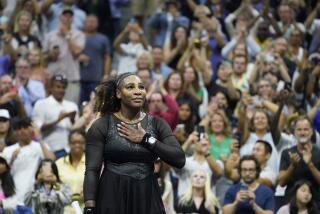Venus Williams exits U.S. Open because of autoimmune disease
Reporting from New York -- Venus Williams isnât ready to walk away from tennis, but she had to Wednesday, leaving the U.S. Open with her head down.
Williams, 31, pulled out of her second-round match against 22nd-seeded Sabine Lisicki, a big-serving German who is a decade younger than Venus.
In a statement, Williams said she had an autoimmune illness called Sjogrenâs syndrome. The illness, Williams said, âaffects my energy level and causes fatigue and joint pain.â
Carlos Fleming, Williamsâ longtime agent, looked downcast outside the locker room after the announcement.
âI just hope sheâs OK,â he said. âI hope sheâll get healthy again and be fine.â
Williams hadnât played since losing in the fourth round at Wimbledon in July and was unseeded at the U.S. Open for the first time since she debuted in 1997 and made it to the final.
But after winning her first-round match Monday, Williams spoke with delight about being on the court and hope about her future.
âIâd be at a $50,000 challenger where I live at,â she said. âIâd be at any tournament I could play. I just want to play tennis. It doesnât matter what the tournament is, I just want to play.â
Less than two days later, though, there are questions about whether Williams will be back in the sport in which she has won seven major titles, including two U.S. Opens.
Dr. Eric Matteson, chairman of the rheumatology department at the Mayo Clinic, said Sjogrenâs causes fatigue but can do much more. The most common symptoms are extreme dryness of the eyes and mouth, but it can affect other organs.
âIt can cause joint pain and joint swelling,â he said. âIt can cause nerve disease in the hands and legs and even affect the central nervous system and cause kidney disease and lung disease.â
Dr. John FitzGerald, an assistant clinical professor of rheumatology at UCLA, said most Sjogrenâs patients have an inflammatory phase and a chronic phase. FitzGerald said itâs possible that if Williams has a mild case, she might be ready and able to play at the Australian Open in January.
Matteson said the future for an elite athlete would be problematic if the case is severe.
âAn athlete might see a very dramatic drop in his or her level of performance, even once the disease is under control,â Matteson said.
Treatment also varies depending on the severity. It can be as simple as eye drops to control dry eyes, Matteson said. It can be more complicated though. FitzGerald said some patients need treatment with corticosteroids such as prednisone to tame inflammation, and Matteson said some patients need chemotherapy depending on organ involvement.
Matteson is a tennis fan. He said he received a text message from his wife Wednesday when Williamsâ news became public.
âIâd love to see her back at the top of her game,â Matteson said. âBut I donât think itâs a guarantee.â
Andy Roddick, who turned 29 this week and who has known Venus and her sister Serena for almost 20 years, said he was worried about Venus.
âI do know one thing,â Roddick said after outlasting 33-year-old American Michael Russell, 6-2, 6-4, 4-6, 7-5, in a first-round match Wednesday night, âIâm very concerned. If Venus isnât playing at the U.S. Open, itâs got to be something. She didnât withdraw because sheâs sneezing too much.â
Two unheralded young Americans earned major upset victories and moved into the third round. Christina McHale, 19, picked up a 7-6 (2), 6-2 win against eighth-seeded Frenchwoman Marion Bartoli, who beat Serena Williams at Wimbledon, and 21-year-old Irina Falconi, ranked 78th in the world, eliminated 14th-seeded Dominika Cibulkova, 6-2, 3-6, 7-5.
twitter.com/mepucin
More to Read
Go beyond the scoreboard
Get the latest on L.A.'s teams in the daily Sports Report newsletter.
You may occasionally receive promotional content from the Los Angeles Times.










